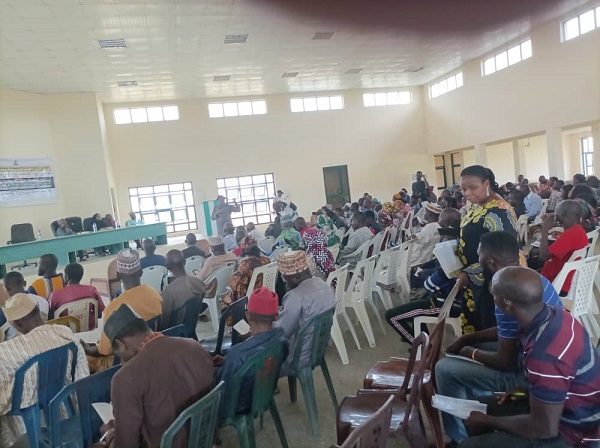…sensitises farmers on provision of National Fertiliser Quality Control Act

In a bid to sustain the growth of the agricultural sector in Nigeria, the Federal Ministry of Agriculture and Rural Development has advocated for the local production and use of organic fertilisers to enhance production, improve soil conditions, extend shelf-life of organic produce, amongst others.
This advocacy was made during a training workshop on zonal promotion of organic fertiliser and use at the local level, using eco-friendly agricultural technologies, organised by the Department of Farm Inputs Support Services at the Agricultural Show Ground, Karu local government area of Nasarawa State.
In his speech, the director, Mr. Muhammad Kwaido, represented by the assistant director, organic fertiliser quality control, Mrs. Afusatu Babalola stated that the programme would provide an ample opportunity for increased advocacy for the use and adoption of organic fertiliser in Nigeria and to halt the current rejection of Nigerian produce in the international market.
“Nigerian farmers, I believe, are prepared to adopt the use of organic fertilisers as the country is blessed with abundant raw materials such as plant residues, poultry, livestock waste, biogas residue and agricultural by-products that are readily available locally.
“The increasing consumer demand for organic produce locally has also indicated that the sector has a high growth potential. As you may be aware, presently most of the organic products on sale across the country are imported from overseas. These need to be bridged to generate wealth and employment, particularly among the youths,” the director added.
He listed the Russia-Ukraine conflict, importation of inorganic raw materials such as muriate of potash (MOP) and difficulty in accessing foreign exchange as factors which necessitated looking inwards and paying attention to the local preparation of these organic fertilisers.
Speaking further, the director revealed the benefits of adopting the use of locally made organic formulations, which would invariably reduce the cost of purchasing fertilisers, improve soil fertility, improve general livelihood of farmers, amongst others.
In his presentation, the head, National Root Crop Research Institute (NRCRI) Nyanya sub-station, Dr. Innocent Onyekwere highlighted the objectives of promoting organic fertiliser production and its uses locally by deploying eco-friendly, agricultural technologies.
One of the participants at the workshop, a small-holder farmer, Mrs. Aishatu Gunde thanked the ministry for the initiative and was delighted at being part of it.
“I have gained knowledge on how to prepare local organic fertiliser and its benefits, instead of using the chemical fertiliser.”
Similarly, the department of farm inputs support services also sensitised farmers on the provisions of the National Fertilizer Quality Control (NFQC) Act.
The director, FISS, who was represented by the deputy director, inputs use and National Agriculture Growth Scheme, Ishaku Buba revealed that the Act and regulations contained provisions to address any abnormality that could be perpetrated by any player operating in the fertiliser sub-sector.
He pointed out that the ministry had created a platform for farmers to know the status of input producers and the distributors, the quality status of the products they are producing and marketing, the means of identifying fake or substandard products, complain mechanism in place to report observed abnormalities and seek redress and compensation for substandard products purchased.
A statement by the ministry’s director, information, signed by Eremah Anthonia said representatives of the Nasarawa State coordinator, FMARD, head of River Rice Farmers Association, the head of Maize Association of Nigeria, amongst others, were present.


